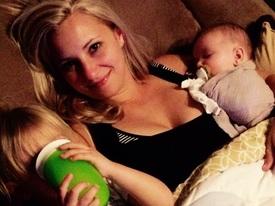Heart Rate, Weight Loss and Calories

brownchristian
Posts: 58 Member
I am so confused. I have been reading that a lower intensity workout burns more fat. Higher intensity tends to burn muscle. I am having a hard time keeping my heart rate up. When I run at a speed of 5.3 on the treadmill I can maintain a 155 HR but the second I slow down to a fast walk / jog my HR drops within a minute to the mid 120's and even with incline on the treadmill I have a hard time getting it up to the 130's. So by running and keeping my HR in the 150's am I burning muscle or fat.
By the way I am 34, 5'9" and weigh 196 right now.
Thanks for your help.
By the way I am 34, 5'9" and weigh 196 right now.
Thanks for your help.
0
Replies
-
I am also curious on this subject.:grumble: .thanks for posting it, :flowerforyou: I was wondering this morning when I work out on my elliptical what should my heart rate be at to burn fat.
 ..thanks for any help anyone can give..
..thanks for any help anyone can give.. 0
0 -
Your body doesn't burn muscle to fuel your workouts. You burn carbs (more accurately, glucose) and fat, both at the same time, but at different ratios depending on the intensity of your workout. At higher intensities, your body will use more carbs than fat to fuel you, and at lower intensities it will use more fat than carbs.0
-
I find it confusing as well but this article makes sense to me. They reference the American College of Sports Medicine and it's written in plain English

http://whatscookingamerica.net/HealthBeauty/HighIntensityWorkout.htm0 -
I am no expert, but I did have a bunch of testing done at my gym (Lifetime Fitness) to find out my exact numbers and here's the deal. My AT (anaerobic threshold), which is the point my body stops burning fat for fuel is 163. Between 120 and 162, by body uses glucose and fat for fuel at different ratios. In the 120's through the 140's the higher percentage is fat, then it flips to glucose in t he 150's. So, I'm still burning fat in the 150's, just a lower percentage of each calorie. It's still good to work at a high intensity, because the calorie burn is high, so even though the percentage of fat is lower, it's still there. Also, the more you push your AT, the more you train your body to burn fat at higher levels. You don't have to spend a bunch of money (like I did) to know if you are at your AT or not. Your body wants to burn fat for fuel, it's more comfortable, so when you stop, you feel it. When I go over my AT, I feel a little dizzy, I can't breathe at all and (to quote my trainer) " I'm looking for a way out". Everyone's AT is different and a higher number doesn't always reflect fitness. Mine, like I said, is 163. I am a 270lb woman who has never been an "athlete". My husband's is only 169 and he is a 195lb man who was in the army for 6 years, ran track in college, works out six days a week and runs half marathons for fun. It just takes A LOT to get his heart rate up. Anyway, I hope all this helps.0
-
Your body doesn't burn muscle to fuel your workouts. You burn carbs (more accurately, glucose) and fat, both at the same time, but at different ratios depending on the intensity of your workout. At higher intensities, your body will use more carbs than fat to fuel you, and at lower intensities it will use more fat than carbs.
During extended (60 to 120 minutes) higher-intensity, steady-state aerobic workouts, as the workout progresses, the body will derive up to 15% of energy from protein, as glycogen stores become more depleted. Most people don't have to be concerned about this, but, technically, under some conditions, there is a potential for some "muscle burning". It's totally overblown by the muscle heads, but it does exist.0 -
Azdak is hitting it on the head. It frustrates me when people make comments about things they are guessing about at best on this site. You body most definitely will burn muscle for fuel, and you need to either replace the glycogen with quickly metabolized fuel or risk burning muscle. I don't see this as being overblown, knowing the hard work you put in to building the muscle.
Without doing a V02Max test, we can estimate your max heart rate at 186 (220-age). So, at 155, you're up to about 83% HRM. That's high, and you're tapping into the muscle quicker than you know. (And I'm not a Muscle Head - who are apparently inferior to Cardio Bunnies in the pecking order of MFP's food chain.).
Mix it up, if you have more time, hit a long, low intensity workout to build your endurance. Then increase your V02Max / lactic threshold by hitting the peaks with interval training...working at an increased intensity, and hitting your higher % HRM in short bursts and recovering. Long and extended high intensity workouts will do nothing but kill your morale, your joints and your precious muscle.0 -
Here's a list of the Exercise "Zones" as given by thewalkingsite.com and the benefits of each.
TRAINING ZONES
Healthy Heart Zone (Warm up) --- 50 - 60% of maximum heart rate: The easiest zone and probably the best zone for people just starting a fitness program. It can also be used as a warm up for more serious walkers. This zone has been shown to help decrease body fat, blood pressure and cholesterol. It also decreases the risk of degenerative diseases and has a low risk of injury. 85% of calories burned in this zone are fats!
Fitness Zone (Fat Burning) --- 60 - 70% of maximum heart rate: This zone provides the same benefits as the healthy heart zone, but is more intense and burns more total calories. The percent of fat calories is still 85%.
Aerobic Zone (Endurance Training) --- 70 - 80% of maximum heart rate: The aerobic zone will improve your cardiovascular and respiratory system AND increase the size and strength of your heart. This is the preferred zone if you are training for an endurance event. More calories are burned with 50% from fat.
Anaerobic Zone (Performance Training) --- 80 - 90% of maximum heart rate: Benefits of this zone include an improved VO2 maximum (the highest amount of oxygen one can consume during exercise) and thus an improved cardiorespiratory system, and a higher lactate tolerance ability which means your endurance will improve and you'll be able to fight fatigue better. This is a high intensity zone burning more calories, 15 % from fat.
It's essential to calculate your Max heart rate which as Hawkeye Guy said before is 220 - age for men, and 226 - age for women.
As for the burning muscle, well unless you're starving yourself, you don't have to worry about burning muscle for fuel. Even dieting you should have enough fuel in your blood to handle a moderate amount of exercise without a problem.0 -
My BP is low (sometimes in the 90/50 range) and my pulse is high. It's been that way my whole life, no matter how often I exercise. So I have to wonder if that standard calculation isn't a generalization (like most) that needs to be modified for some people?
Based on the standard calculations, (I'm 35 and my RHR is around 96), I'm in the Healthy Heart Zone pretty much all day long. It takes me about 10 seconds to jump into middle of the Fitness Zone, and not much more effort to be in the Anaerobic Zone, occassionally "slowing down" to the Aerobic Zone during a typical circuit training session. All the while, I can carry on a normal conversation (although I'm sweating up a storm). It's not until my heart rate gets to the 190-200 range where I start to not feel so good.
I'm not saying I'm in awesome shape or anything (hardly!!), but I find it hard to believe I can sit around on my rear and burn fat?? Thoughts??0 -
Azdak is hitting it on the head. It frustrates me when people make comments about things they are guessing about at best on this site. You body most definitely will burn muscle for fuel, and you need to either replace the glycogen with quickly metabolized fuel or risk burning muscle. I don't see this as being overblown, knowing the hard work you put in to building the muscle.
It's overblown because you are making some classic mistakes: 1) assuming that protein used as a substrate during exercise is "burning muscle", 2) assuming that what occurs metabolically during an exercise workout is a discrete event, and unrelated to what occurs the other 23+ hours in the day, other 7 days in the week, etc and 3) assuming that any protein used during an exercise session somehow represents a distinct loss of muscle mass. That is just as misguided as thinking the the fat burned during an exercise session represents a definitive reduction of body fat.
Our bodies are constantly active metabolically. Our physiology is set up so that there are constant activities taking place in balance. We see changes as a linear movement originating from status A to status B. Yet there are usually opposing "actions" if you will, constantly taking place--any change represents one side of the equation becoming more prominent over the other.
The body constantly undergoes protein degradation and assimilation. Constantly. And proteins are used for much more than just muscle. For a relatively small amount of this protein turnover to be diverted occasionally into a fuel substrate for an extended cardio workout is a transient and insignificant event.0 -
Im confused too! :sad:
I burned 680 cals tonight running and rowing, in the majority of that time my HR was 75% and above (mostly over 80%), so basically then I would've burned more fat by walking (which is what I have to do to acheive the "fat burning zone") for longer? To me isn't a work out!
As soon as I begin running (slow pace) my HR goes to around 183. So should I not run if I want to lose weight?0 -
Azdak is hitting it on the head. It frustrates me when people make comments about things they are guessing about at best on this site. You body most definitely will burn muscle for fuel, and you need to either replace the glycogen with quickly metabolized fuel or risk burning muscle. I don't see this as being overblown, knowing the hard work you put in to building the muscle.
Without doing a V02Max test, we can estimate your max heart rate at 186 (220-age). So, at 155, you're up to about 83% HRM. That's high, and you're tapping into the muscle quicker than you know. (And I'm not a Muscle Head - who are apparently inferior to Cardio Bunnies in the pecking order of MFP's food chain.).
Mix it up, if you have more time, hit a long, low intensity workout to build your endurance. Then increase your V02Max / lactic threshold by hitting the peaks with interval training...working at an increased intensity, and hitting your higher % HRM in short bursts and recovering. Long and extended high intensity workouts will do nothing but kill your morale, your joints and your precious muscle.
sounds right to me. I'm doing the 30 day shred which I think is high intensity with short low impact intervals. its actually 3min strength, 2min cardio and 1 min ab circuits for a total of 3 circuits. are u saying that this is not good as its "Long and extended high intensity workouts will do nothing but kill your morale, your joints and your precious muscle" ?
sorry I have a HRM but only use it to track calories, never really paid much attention to my actual HR and how long I'm in each zone, etc. I'm clueless when it comes to that.
thnx0 -
I'm confused too. When I run my heart rate goes up to about 155 and as soon as I take it down to a fast walk it drops to about 130-135. I have no idea what zone I should be in. Very confusing!0
-
I find it confusing as well but this article makes sense to me. They reference the American College of Sports Medicine and it's written in plain English

http://whatscookingamerica.net/HealthBeauty/HighIntensityWorkout.htm
That was a great article...very clear. Thanks for posting the link.0 -
I'm confused as to if you want to be in the aerobic or the anaerobic zone for weight loss?0
-
Its calories in verses calories out!!! Stop worrying about all the irrelevent stuff! Just exercise! and burn calories! I don't believe there is a wrong way to exercise. Enless its life threatening ofcourse. Just get on there and go! Anyone that is on a deficit of calories and whom is exercising is going to lose some muscle tissue along with fat and anything else in your body that your body chooses to use as fuel! But if you are eating healthy and providing your body fuel for exercise and you are lifting weights and doing cardio, you have nothing to worry about!0
-
I find it confusing as well but this article makes sense to me. They reference the American College of Sports Medicine and it's written in plain English

http://whatscookingamerica.net/HealthBeauty/HighIntensityWorkout.htm
That was a great article...very clear. Thanks for posting the link.
Agree - article explains it well! I'll keep doing what i'm doing :happy:0 -
Bump.0
-
Its calories in verses calories out!!! Stop worrying about all the irrelevent stuff! Just exercise! and burn calories! I don't believe there is a wrong way to exercise. Enless its life threatening ofcourse. Just get on there and go! Anyone that is on a deficit of calories and whom is exercising is going to lose some muscle tissue along with fat and anything else in your body that your body chooses to use as fuel! But if you are eating healthy and providing your body fuel for exercise and you are lifting weights and doing cardio, you have nothing to worry about!
That's what I'm screaming. I'm going to give myself anxiety trying to worry about all this stuff! HAHA!0 -
It frustrates me when people make comments about things they are guessing about at best on this site.
I'm right there with you.0 -
bump0
-
Right on, MissKim! If you start overthinking it you'll drive yourself crazy!
Right now I am have great results keeping my heart rate at between 120 & 125 when I work out (I'm a 45 yr old woman), both when on the treadmilll and strength training. I have lost 15 lbs (started at 199, I'm 5'3") and 1 clothing size since Feb 1st. I am eating whatever MFP says I should (for total calories) every day, except Saturdays when I eat whatever I want, but still track it.
Unless you're an elite or competitive athlete, keep it simple - burn more calories than you take in and you'll lose weight.0
This discussion has been closed.
Categories
- All Categories
- 1.4M Health, Wellness and Goals
- 398.4K Introduce Yourself
- 44.7K Getting Started
- 261K Health and Weight Loss
- 176.4K Food and Nutrition
- 47.7K Recipes
- 233K Fitness and Exercise
- 462 Sleep, Mindfulness and Overall Wellness
- 6.5K Goal: Maintaining Weight
- 8.7K Goal: Gaining Weight and Body Building
- 153.5K Motivation and Support
- 8.4K Challenges
- 1.4K Debate Club
- 96.5K Chit-Chat
- 2.6K Fun and Games
- 4.7K MyFitnessPal Information
- 17 News and Announcements
- 21 MyFitnessPal Academy
- 1.5K Feature Suggestions and Ideas
- 3.2K MyFitnessPal Tech Support Questions














